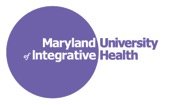Q & A with Maryland University of Integrative Health’s (MUIH) Dean of Naturopathic Doctorate Program, Dr. Elizabeth Pimentel, N.D.
What is the Maryland University of Integrative Health’s mission statement?
The mission of Maryland University of Integrative Health (MUIH) is:
A distinctive community of scholars, researchers, practitioners, and advocates, Maryland University of Integrative Health promotes whole person, relationship-centered healthcare. Through discovery and exploration, we deliver progressive educational programs, advance innovative clinical models, build mutually beneficial partnerships, and provide opportunities for fulfilling careers.
What are Maryland University of Integrative Health’s goals for including naturopathic medicine in the curriculum?
MUIH has been a pioneer and driving force in the national movement toward wellness, disease prevention, and relationship-centered healthcare, offering graduate programs in areas related to natural medicine such as acupuncture, clinical nutrition, herbal medicine, health and wellness coaching, nutrition, and yoga therapy. Its programs integrate healing traditions and contemporary science, and acknowledge the wisdom of the body and nature as a teacher to educate diverse and erudite healthcare professionals for today and tomorrow. As an anchoring academic institution for the emerging wellness arena in the U.S., MUIH has trained over 2,600 wellness professionals and has a current, annual enrollment of over 550 graduate students. Graduates not only help frame the healthcare options in the U.S. and abroad, but are also instrumental in encouraging people to choose more natural lifestyle choices that improve their overall health and wellness.
The new Doctorate in Naturopathic Medicine (ND) aligns with MUIH’s mission and vision and will continue to advance the University’s leadership in the integrative health and wellness field in addition to expanding our natural care services to the community. It offers MUIH, and all its students and faculty, physician-level practitioners and partners within the walls of the University. Its students and clinical interns will be visible in the research department, student teaching clinic, and the wellness policy and leadership initiatives that are in development. The ND program expands and complements MUIH’s curricular content and diversifies career options for graduates. It will help to enrich existing programs by offering curricular cross-pollination and opportunities for dual degrees, as well as for interprofessional education, integrative clinical experiences, and collaborative research for all students.
How does Maryland University of Integrative Health’s program differ from other naturopathic schools such as Bastyr or NUNM?
Students graduating from any of the accredited naturopathic schools in North America can be expected to meet the same standards established by the Council on Naturopathic Medical Education and recommended by the Association of Accredited Naturopathic Medical Colleges. MUIH’s School of Naturopathic Medicine has been guided by those same standards. Naturopathic medical programs differ in their overall approach and philosophy, curricular emphasis, academic and clinical models, and institutional culture.
Our overall approach and philosophy can be gleaned from the mission and vision of MUIH’s School of Naturopathic Medicine and the institutional culture and values that support it.
Mission: To prepare graduates to be self-reflective leaders, practitioners, and architects of change in whole person care, community health and wellness, research, and health policy.
Vision: We are leaders in the global transformation of health and wellness creation through innovation, collaboration, and the education of naturopathic doctors in the wise practice of medicine, cultivating healing presence and honoring the inherent wisdom of body and nature.
MUIH has long educated practitioners in the innate wisdom of the body, the healing power of nature, and healing presence. The culture and philosophy of healing that form the foundation for MUIH programs are a natural fit for a School of Naturopathic Medicine, which cultivates a student-centered, holistic approach to naturopathic medical education and facilitates the transformative experiences that define the path to becoming a healer.
Instruction will focus on the clinical applications of the biomedical sciences, therapeutic modalities, and clinical sciences, in addition to the development of effective communication and leadership skills. Medical technology, genomics, and bioinformatics are explored as students learn to navigate emerging healthcare trends.
The curriculum places a strong emphasis on naturopathic philosophy, relationship-centered care, determinants of health, cultural awareness, and evidence-informed practice. These threads are deeply woven into the program, which is structured as three articulated tracks: didactics, practitioner development, and clinical education.
Our high-touch, student-centered approach affords students flexibility and presents a coherent model for learning and synthesizing the complexities and nuances of naturopathic medicine. Courses have been thoughtfully integrated and clustered to enhance and streamline learning. The curriculum will be delivered in a spiral model, utilizing best practices in medical education, incorporating elements of contemplative education, and implementing digitally-enhanced tools and strategies to engage students and accommodate diverse learning styles. Learning modules will primarily be online, with face-to-face time reserved for discussion of difficult concepts, team- and case-based learning, and other experiential activities.
Two course series anchor the curriculum and serve as touchstones for students during the program to continually reinforce the key threads woven throughout the curriculum – naturopathic philosophy, relationship-centered care, determinants of health, cultural awareness, and evidence-informed practice. These courses, along with clinical education, also facilitate and guide all aspects of practitioner development and the transformative process of becoming a healer.
- Clinical Investigations and Applications (CIA) accompanies the biomedical and clinical sciences through year three. In CIA, students synthesize biomedical, clinical, and philosophical concepts gained from coursework into case-based learning and other experiential activities while becoming adept at constructing clinical questions, analyzing relevant evidence, reflecting on biases, and communicating and applying conclusions to enhance the informed practice of naturopathic medicine. Students learn to approach patient care through an equity lens by increasing awareness of personal, sociopolitical, and institutional biases and their impact on patient health and well-being.
- Practitioner’s Journey prepares students for practice through the development of the personal, professional, technical, and clinical skills, behaviors, and attitudes associated with becoming a compassionate and competent naturopathic doctor. Throughout the series, students explore the various facets of practitioner development, communication, cultural awareness, relationship-centered care, interprofessional collaboration, and all aspects of the clinical encounter. Students develop self-awareness and meaningful self-care practices. They learn to be a healing presence in their interactions with others, establish and maintain a therapeutic alliance, and reinforce the self-care practices and work-life balance that prevent stress and burnout. In years three and four, grand rounds are incorporated into this series, in addition to small group discussions of patient cases and the student practitioner’s personal experience.
Clinical education begins in trimester one and is carefully curated to guide students through all facets of the patient encounter and prepare them for clinical practice. Through trimester five, the emphasis is on community medicine, population health and group visits through the lens of determinants of health and health disparities; and patient engagement, education, and empowerment through the exploration of doctor as teacher. Partnerships with off-site clinics provide students with a solid foundation in community health. In trimesters six through eleven, students take on increasing responsibilities in patient care, become adept at managing data (i.e., bioinformatics), conduct their own patient outcomes assessment, and develop the skills necessary for informed practice.
Students who attend the School of Naturopathic Medicine at Maryland University of Integrative Health will find themselves immersed in a diverse, vibrant, multidisciplinary community that is guided by the principles of interconnection, holism, transformation, diversity, and resilience; and by the values of community, mindfulness, integrity, inquisitiveness, and discernment. These principles and values are embedded within the fabric of the institution and are the beacon by which strategies, initiatives, and programs are launched and sustained.
What are the prerequisites for admission into Maryland University of Integrative Health’s program?
Applicants must demonstrate successful completion of a Bachelor’s degree. Applicants are expected to have a minimum 3.0 GPA in the following areas: prerequisite science courses, cumulative science and humanities prerequisites, and cumulative GPA for all institutions for higher learning attended. Grades below 2.5 in a prerequisite course may not be accepted.
- Biology: 6 semester credits, no labs required
- Chemistry: 9 semester credits and at least 2 labs in general chemistry and organic chemistry; 3 semester credits of biochemistry may be substituted for up to 3 credits of general or organic chemistry.
- Physics: 3 semester credits of algebra- or calculus-based physics; lab not required
- Humanities/English: 15 semester credits comprised of the following: 6 semester credits general humanities; 6 semester credits psychology; 3 semester credits English composition
As dean, what do you most want to accomplish while in this position? What methods will you use? What is the most challenging part of your job?
As founding dean of the newest naturopathic medical program, I am acutely aware of the importance of balancing the broadest scope of practice with foundational naturopathic medicine. My perspective and approach are informed by my experience in family practice, midwifery, legislative advocacy, program development, teaching, administration, and accreditation. Approaching this process with a “beginner’s mind” was both the most challenging and, also, the best part of developing the program. Starting a new program from scratch provided the impetus to deeply consider how to educate naturopathic doctors now, given the evolving healthcare landscape, best practices in pedagogy and medical education, and the burden of chronic disease and suffering crippling our communities.
My primary goals for this new program are threefold:
- Establish an innovative, student-centered program that addresses a real need in the mid-Atlantic region – that of primary care in community health settings. In support of this initiative is our commitment to diversifying our staff, faculty, and students by actively recruiting members from underrepresented and marginalized populations in order to serve the communities that are most impacted by disparities in health care and public policy. Students will experience various aspects of community medicine and population health, and will become adept at facilitating group visits and managing interpersonal dynamics.
- Graduate naturopathic doctors who are grounded in naturopathic philosophy and confident in applying naturopathic principles and therapeutics to clinical practice. We know from various longevity studies such as the one conducted in Roseto, PA1 as well as research in other “Blue Zones2“ that lifestyle, behaviors, and social factors are the primary drivers of health. Mindfulness, breath, food, herbs, homeopathy, postural alignment, movement, and relationships – in other words, the fundamentals of naturopathic medicine – are not just powerful medicine, they are the basis for ongoing health and wellness.
- Become a facilitator and a conduit for students committed to serving their communities and becoming architects of change. Provide students with the opportunity to engage in interprofessional education and collaboration, integrative team-based clinical care, and collaborative research. In addition, critically assess the existing healthcare systems paradigm, health policy, and the social responsibility of the naturopathic physician to bridging the dialogue to effect change.
In what ways within, and from the greater ND community, does Maryland University of Integrative Health receive support for the mission and goals?
The Council on Naturopathic Medical Education (CNME), Association of Accredited Naturopathic Medical Colleges (AANMC), the Council of Chief Academic and Clinical Officers (CCACO, a subcommittee of the AANMC), North American Board of Naturopathic Examiners/Naturopathic Physicians Licensing Exam (NABNE/NPLEX), the Institute for Naturopathic Medicine (INM), the American Association of Naturopathic Physicians (AANP), and local state associations, in particular, the Maryland Naturopathic Doctors Association (MNDA) all serve to guide, support, and encourage this fledgling program that is another step in growing the naturopathic profession. Individually and collectively these associations have provided assistance, advice, and resources to help in the development of the program.
What do you think naturopathic medicine’s role is in your region and how do you see that furthering the medicine globally?
MUIH is located in Laurel, MD, mid-way between Baltimore and Washington, D.C. The corridor between the two is a paradox of immense wealth and desperate need, and represents a global brain trust of premiere healthcare services, innovative research, and domestic and international government agencies. The DC/Maryland/Virginia (DMV) metropolitan area is a melting pot of cultures, progressive thinking, and global influencers. MUIH and the School of Naturopathic Medicine are poised to partner, collaborate, and help to shape the conversation that will impact the future of healthcare.
In spite of these tremendous resources, the DMV metropolitan area also has large pockets of under-served populations without access to basic healthcare needs. Gross health disparities and a high mortality rate and are complicated by a variety of systemic sociopolitical, economic, and environmental factors. MUIH and the School of Naturopathic Medicine recognize the responsibility to acknowledge and address these issues by training practitioners to meet these needs. From “Prozac nation” (now Xanax) to the opioid epidemic, people are suffering. Not just physically, but mentally, emotionally, and spiritually as well. In a world where we can be connected 24/7, social isolation and the lack of meaningful connection are every bit as important as clinical interventions. Graduates of MUIH’s School of Naturopathic Medicine will be well prepared to engage in relationship-centered, whole-person care, implementing the tenet of doctor as teacher to educate and empower patients and their communities.
How are you making Maryland University of Integrative Health and/or its efforts known or visible in mainstream society?
MUIH is engaging in multiple streams of activity to build awareness of the School of Naturopathic Medicine. Open houses, webinars, press releases, social media, traditional media, graduate fairs, and speaking engagements are all avenues engaged by the school, Admissions, and University Advancement Team.
When is the application deadline?
The priority deadline for fall 2018 admissions is April 1, 2018. Applications will be accepted as late as August 1, 2018.
How long is the course of study?
The naturopathic program is a four-year, full-time, in-residence course of study taking place over 11 trimesters.
If someone were already working on their post-graduate degree but needed to acquire some pre-reqs; how would you recommend accomplishing that so that they’re accepted by MUIH?
Many opportunities exist to satisfy the prerequisites needed for admission to the program, from community colleges and undergraduate institutions, to online formats and face-to-face courses.
What about the submission standards, if one is already in a master’s program and has the prerequisites; would the submission standards change for this type of student?
The admissions standards are the same regardless of the background and education of the student. Anyone with specific questions about the admissions process can call our Admissions team at 410-888-9048 X6647, or email [email protected].
Dr Pimentel’s Bio and Credentials

MUIH Dean of Naturopathic Doctorate Program, Dr Elizabeth Pimentel, ND
Elizabeth (Beth) Wotton Pimentel, N.D., is the Dean of MUIH’s School of Naturopathic Medicine. She brings decades of experience in the fields medicine and integrative health to MUIH. With dozens of publications and presentations on naturopathy and higher education to her name, Dr. Pimentel presently works as a consultant for issues related to accreditation, standards of practice, integrative medical education, curriculum development, outcomes and competencies, and health and wellness for individuals and in the workplace. Most recently, she developed the introductory course “Visionary Health and Medicine” for the Academy of Integrative Health and Medicine Fellowship.
Dr. Pimentel began naturopathic family practices in New England in 1996, where she held leadership roles in the Massachusetts Society of Naturopathic Physicians and advised Seattle Midwifery School in the development of a satellite Northeast program. Upon relocating to California, Dr. Pimentel worked as the Government Affairs Consultant to the California Association of Naturopathic Physicians (2002-2004).
Dr. Pimentel’s extensive work in the field of naturopathic and interdisciplinary medicine ultimately led to her appointment as Clinical Assistant Professor at the University of Bridgeport College of Naturopathic Medicine (UBCNM) in 2006, where she taught courses and supervised student clinicians in the UB Naturopathic Clinic and developed a mind-body specialty shift. In 2008, Dr. Pimentel was named Associate Dean for Academic Affairs at UBCNM, serving in that role until 2011 when she was appointed Dean of the College of Naturopathic Medicine.
Under her leadership, The Center of Excellence in Generative Medicine was created and an innovative generative medicine curriculum combining genomics and naturopathic medicine was added to the college. For the classroom, Dr. Pimentel took steps to integrate topics across disciplines and enhance the progressive outcomes assessment process, and for the community she established an annual all-school Philosophy Day to ensure the ongoing engagement and assessment of naturopathic healing philosophy in the classroom, clinic, and community. Dr. Pimentel also served on the board of the Association of Accredited Naturopathic Medical Colleges and participated in its Council of Chief Academic and Clinical Officers, working to establish standardized learning outcomes across accredited Canadian and US naturopathic programs, and to explore inter-institutional collaboration for faculty and students.
Dr. Pimental earned her Doctorate of Naturopathic Medicine from Bastyr University in 1995 and her Certificate of Midwifery in 1996. She serves as Board Member on the North American Board of Naturopathic Examiners and Accreditation Evaluator on the Council on Naturopathic Medical Education.
About Maryland University of Integrative Health (MUIH)
 Maryland University of Integrative Health is one of the nation’s leading academic institutions for natural medicine. For nearly 40 years, MUIH has educated and informed practitioners and leaders in health and wellness through transformative and relationship-centered programs that draw from traditional wisdom and contemporary science.
Maryland University of Integrative Health is one of the nation’s leading academic institutions for natural medicine. For nearly 40 years, MUIH has educated and informed practitioners and leaders in health and wellness through transformative and relationship-centered programs that draw from traditional wisdom and contemporary science.
Progressive graduate degrees in a wide range of disciplines are offered both on campus and online. In the on-campus Natural Care Center and community outreach settings, MUIH provides compassionate and affordable healthcare from student interns and professional practitioners, and delivers more than 30,000 clinical treatments and consultations each year. For staff and faculty, MUIH offers a collaborative and vibrant work environment that is mission and values-driven. For more information about the School of Naturopathic Medicine or MUIH, please visit www.muih.edu/academics/doctoral-degrees/doctor-naturopathic-medicine.










